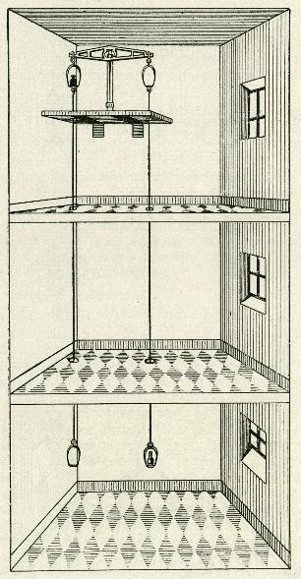By constructing a precise balance for comparing the weight of bodies placed in different heights above the ground, Philipp von Jolly empirically validates Newton's law of gravitation.
Jolly describes 1881 in the publication of his results the experimental setting:
The room which was offered to me by the generosity of the administration of the university was a tower standing free at three of its sides. The stairway is spacious. The stairs lead upwards alongside the walls and leave in the center a free space with a side of 1.5 meters and a height of 25 meters. The balance and a metering telescope were placed at the top protected against vibrations. From each of the upper scales a wire went downwards through the staircase, protected by a pipe made of zinc plate. At the lower end, a second pair of scales was suspended.
Jolly used weights of 5 kg and calculated the difference expected according to Newton's law to be 33 mg. This value was close to his empirical result of 31 mg.
 Scene
Scene


 1st Slide
1st Slide
 Branching Point
Branching Point
 Module: Schwerkraft und Traegheit / Hahntisch / internet Dialog
Module: Schwerkraft und Traegheit / Hahntisch / internet Dialog Sequence: 1.0 Vitrine 11210: Schwerkraft und Traegheit
Sequence: 1.0 Vitrine 11210: Schwerkraft und Traegheit  Branching Point: Gravitation and Inertia
Branching Point: Gravitation and Inertia Slide: Jolly Balance
Slide: Jolly Balance Back
Back


